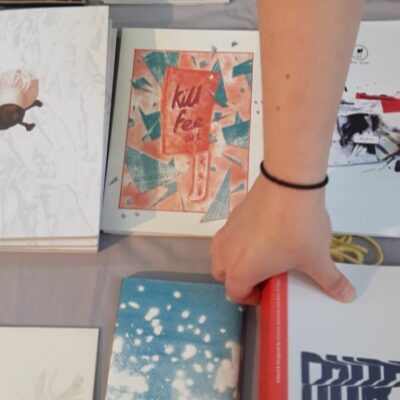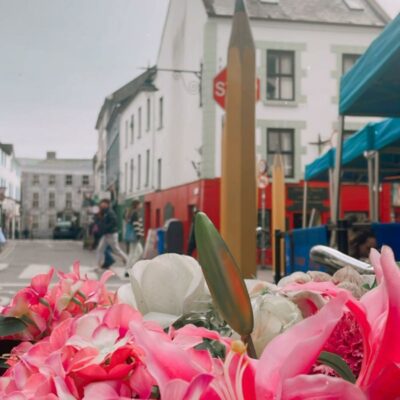03 March 2022
Cúirt New Writing Prize Winners 2022
The Cúirt Festival of International Literature is delighted to announce the winners of The Cúirt New Writing Prize and to welcome both writers to this year’s festival in April.
This prize is kindly sponsored by Tigh Neachtain in memory of Lena McGuire.
Both Winners will read at the New Writing Showcase on Tues 5 April 11:00 which you can book here.
The judges this year are Poet Gail McConnell (poetry) and novelist Lisa McInerney (short fiction) and Siobhán Ní Dhomhnaill (Irish Language).
The Winning Submission for the fiction category is:
“Welcome to the World” by Shane Murphy
This year’s fiction judge Lisa McInerney wrote:
‘A character study that’s compassionate and raw, and a reflection on yearning and identity that was moving and surprising. This isn’t the most polished work on the longlist, but to me it was the most promising. I felt the writer was at once curious and distanced enough from their protagonist to convey a memorable story. A sign, I think, of a gift for words and for people’.
Shane Murphy writes:
‘Thank you to Cúirt Festival and Lisa McInerney for this prize, and to Caoilinn Hughes, Fiachra Kelleher and Eimear Ryan for encouraging early drafts of this story’
The Winning Submission for the Poetry category is:
“I’m Trying to Write a Poem About an Angel” by Siobhán Flynn
This years’ poetry judge Gail McConnell wrote:
‘Often the test of a true poem is the reader’s desire to return to it again and again. I liked this poem when I read it first, but I noticed that I kept re-reading it, and each time I did, I noticed something new. It’s a poem that knows what it’s about – and it’s about a state of unknowing. The poem is asking what it is to be a self and what it is to be a body, and to try to answer its questions it looks beyond the binaries of gender (male and female), and presence (natural and supernatural), hoping ‘to find the right form’. It’s a poem after Analicia Sotelo’s ‘I’m Trying to Write a Poem about a Virgin and It’s Awful’, so it’s playing with imitation in its form as well as in its subject. It sets up a pair of relationships: of the poem with its influence, and of ‘I’ with ‘they’. There’s a lot about it to enjoy – humour, clear diction, good line endings and a self-consciousness about the whole strange endeavour of living and writing – but it’ the ending I marvel at. Wonderful’.
Siobhán Flynn writes:
Winning the 2022 Cúirt New Writing Prize is exhilarating. Writing is such a solitary thing, even more so during the last couple of years, sometimes it feels as if you’re writing into a void and your words are drifting away and disappearing like smoke so it really makes a difference when your work is recognised. This has gladdened my heart and invigorated my poetry muscles, I’m ready to take on that empty page again. Thanks to Gail McConnell and to everyone at Cúirt who makes this festival happen.
Notable Mentions/Shortlisted Submissions for fiction include “Electric Ink” by Paula Dias Garcia
About which Lisa McInerney writes:
‘Such a poignant and affecting account of unrequited love and loss. –
AND
“Fallow” by Serena Lawless about which Lisa McInerney writes
‘With its unflinching exploration of decline both physical and emotional, its bitter empathy, and its skilful descriptions of uncomfortable physical reality.
AND
“Tine Leatromach” by Annemarie Nugent about which Siobhán Ní Dhomhnaill writes:
‘It has a good storyline (essentially it’s about desire and longing – in the story we meet two married women practicing making a campfire for the scouts trip, and we hear the inner voice of one of the women who has developed feelings for her friend, although both are married and have husbands and children). It is a clear piece of writing in Irish, with good descriptions and the last line is powerful and brings the story to a good close’.
Notable Mentions/Shortlisted Submissions for poetry include – “Samhain” by Molly Twomey about which Gail McDonnell writes:
‘I wipe the inner walls with bleach.’ This is the sentence I kept coming back to in the poem. Which walls? Those of the hospital ward, where the speaker resides? Or is it the speaker’s ‘bone cage’, where ‘the creature… bangs its hollow cup inside’? Or the insides of the newly carved pumpkin? Or the structure of the poem itself as it tries to communicate? So much is not said in the poem – and in the silence, difficulty and awkwardness of a child and parent speaking and not speaking in a hospital ward, food comes to bear real feeling: apples, a Twix, beets, a pumpkin and eggs. As winter approaches, these things speak, or seem to speak, where human language stutters, and this transference was what I most appreciated in the poem. – Gail McConnell
AND
“Fásra” by Liam Mac Peaircín
About which Siobhán Ní Dhomhnaill writes:
‘The title of the poem means vegetation. There is a strong poetic voice in the poem, and it is wonderful that this poet is using the Irish language to hone their craft. There is a clear understanding of poetic language and imagery in this poem, as it comments on our mortality as human beings and the finality of death, but ends on a lovely hopeful note about how those we love can live on through the things they do while they’re in the world.

